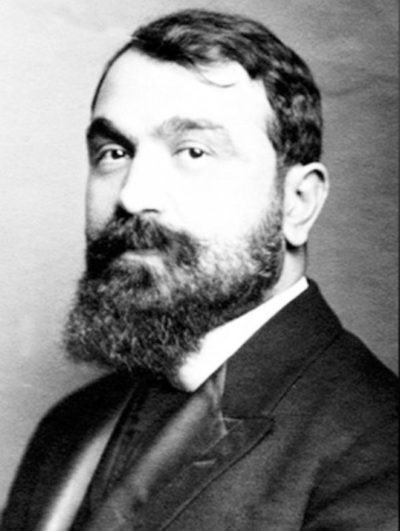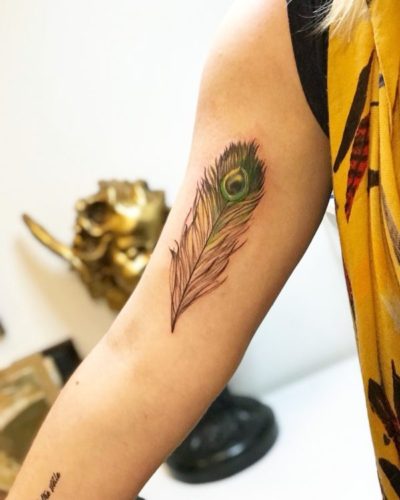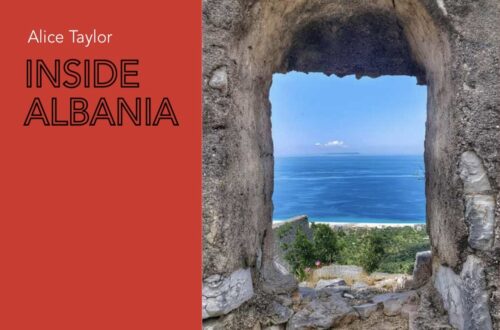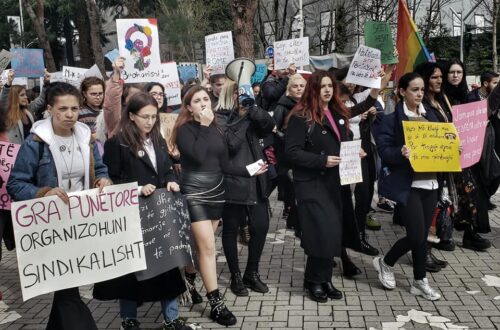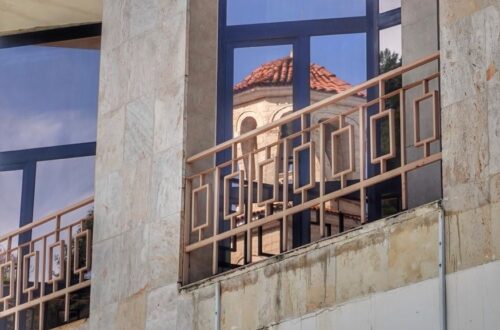If you spend enough time in Albania, you will most definitely come across Fan Noli at some point. In my case, it was last night on Travel Radio, where one of the presenters had a tattoo of him on his forearm. It sparked my interest as the mention of his name started a heated debate around who he was- violent revolutionary, creative genius, or the best thing that had ever happened to Albania? No one could decide. So I decided to do a bit of my own research.
Fan S. Noli was born in the village of Ibrik Tepe in European Turkey on January 6th, 1882. His father was a notable cantor in the Orthodox church and from an early age, he taught his son the ways of Byzantine tradition, and Orthodox customs and culture. Fan attended a Greek secondary school in Edirne before finding a job as a copyist and actor, around the turn of the century. He travelled to Constantinople, Athens and Egypt, where he taught Greek and worked as a cantor in Shibin el Khom until 1906. Then, finding a small Albanian diaspora settled in El Faiyum, he decided to stay and during his time there he wrote many articles in Greek, as well as translating Sami Frasheri’s “Shqiperia- C’ka qene c’eshte e c do te behete?” (“What was it, what is it, and what will become of it?”) into Greek. It was during his time in Egypt that he learnt more about the traditions of Byzantine music and under the guidance of his teacher, the monk Nilos, he decided that his calling was to become an Orthodox priest. Also at this time, he made acquaintance with leaders of the Albanian community in Egypt such as Spiro Dine, Jani Wruho and Athanas Tashko who told him tales of America and planted the seed of emigration in his mind.
Then in April 1906, clutching a second-class steamer ticket, the young Noli set off for the New World, via Naples, finally arriving at his destination in New York on May 10th. He spent three months in Buffalo before moving to Boston where the Albanian publisher Sotir Peci gave him a job as the deputy editor of the Boston-based newspaper “Kombi”.It took him a while to find his place in this strange new place, but after finding his roots in the Albanian community, he founded the Besa-Besen society in Boston.
During this time, the Orthodox Albanian community in America was becoming increasingly unhappy with the Greek control of their church. Then in 1907, a Greek Orthodox priest refused to officiate at the burial of an Albanian in Massachusets on the grounds that as a nationalist, the deceased was excommunicated, Noli saw the opportunity to set up autonomous Albanian Orthodox Church him at the helm. On February 9th, 1908, at the tender age of 26, Noli was made a deacon and then an Orthodox priest.
In 1911, he toured Europe and held Orthodox services in Albanian for colonies in Odessa, Bucharest, Sofia, and Kishinev, before founding the Pan-Albanian Vatra Federation of America which would go on to become the most powerful Albanian organisation in America. At this time, Noli was not only the recognised leader of the Albanian Orthodox community, but he was also an established writer and journalist with distinct nationalist leanings.
Then in November 1912, Albanian was declared as independent and the 33-year-old Noi, having just graduated from Harvard University, returned to Europe and visited Albania for the first time in July 1913. He held the country’s first Orthodox church service in front of Prince Whilhelm zu Wied. Meanwhile, WWII was brewing and Noli returned to America and started writing extensively about the Albanian cause and unstable political system. Over the next few years, his popularity grew and he became not only the Bishop of the Albanian Orthodox Church in America, but he was a widely respected writer, public speaker, and political commentator. He met with US Prime Minister and was also selected as the head of the Albanian delegation to the League of Nations in Geneva which resulted in the country’s ascension to the organisation which is widely considered as one of his greatest political achievement. Membership in the League of Nations resulted in Albania receiving enormous worldwide recognition and far surpassed the hype surrounding Ismail Quemal bey Vlora’s declaration of independence in 1912.
He was described as “a man who would have been remarkable in any country. An accomplished diplomat, an expert in international politics, and a skilful debater. He is a man of vast culture who has read everything worth reading”.
In 1922, he was residing in Albania and was appointed as the foreign minister in the government of Xhafer bey Ypi and then in 1923 he was consecrated as the Bishop of Korca and the Metropolitan of Durres. What followed was a politically tumultuous time in Albania- in February 1924 an attempt was made on the lift of Ahmet Zogu, and in April of the same year, Avni Rustemi was assassinated. At the funeral of Rustemi Noli gave an impassioned speech which provoked such a response from the liberals that Zogo fled to Yugoslavia during the June Revolution. In the June of that year, Fan Noli was proclaimed Prime Minister and then the Regent of Albania. For the following six months, he led a democratic government which tried to cope with the dismal economic and political problems that faced the young state.
He developed a 20-point programme that was designed to modernise and democratise the country through means of agrarian reform, but unfortunately, it was not well received. His support diminished and his government was overthrown by Zogist forces on the 24th of December 1924.
This forced Noli to flee the country and he sought refuge in Italy at the invitation of Benito Mussolini. He then travelled throughout Europe before returning to Boston in 1930. He founded a weekly periodical called Republika (a noticeable dig at Ahmet Zogu who in 1928 proclaimed himself the King of the Albanians. In time, he resumed his duty as the head of the Albanian Autocephalic Orthodox Church, but in 1933, he fell seriously ill but was unable to pay his medical expenses. Help came unexpectedly in the form of 3000 gold franks from Ahmet Zogu which lead to a sort of reconciliation between the two opponents.
After his recovery, he returned to one of his previous passions- music- and at the ripe age of 53, he registered to study at the New England Conservatory of Music, in Boston where he graduated in 1938 as a Bachelor of Music. Over the next few years, he continued various post-graduate studies at Boston University, culminating with a doctorate in 1945 which included a dissertation on Skanderberg.
Following the end of the Second World War, Noli established reasonably good relations with the communist regime of Enver Hoxha in Tirana. He used his substantial influence in America to try to get them to recognise the regime and this earned him the moniker, “The Red Bishop”.
Fan Noli died at the age of 83, in Fort Lauderdale, Florida on the 13th of March 1965.
Throughout the course of his life, he established himself not just as a leading political and religious figure, but as a dramatist, poet, historian, musician, and translator who made significant contributions to the advancement of the Albanian literary language. Amongst the many poems, plays, and essays that Noli penned, one of his most renowned works s a scholarly history of the life of the Albanian national hero, Skanderberg- Hisotria e Skenderbeut, mbretit te Shqiperise. He is recognised today as a revolutionary contributor to the literary, linguistic, and cultural development of Albania.
Follow The Balkanista!